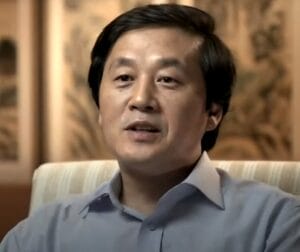Born in North Korea to a father who was a writer and university professor, and a journalist mother, Kim enlisted in the North Korean Army at 17 for the mandatory 10-year enlistment period. He was respected enough that he was encouraged to stay in the military and go to college; he was educated to be a propaganda writer. Over the next 6 years he rose to the rank of captain. When Kim’s father died, “on his deathbed his wish was for me to find our relatives in South Korea,” which included his grandmother and two uncles. Kim exchanged letters with his South Korean uncles, but a friend tipped him that military police had discovered the letters and planned to arrest him for espionage. Knowing what would happen to him, Kim escaped and defected to Dailan, Liaoning province, China, in 1996. There he was captured and interrogated for 40 days before being taken back to the border of North Korea, where he was tortured until he admitted his identity. He was sentenced to death and put on a train to Pyongyang, where his sentence would be carried out.
During that trip, on April 30, 1997, Kim jumped from the train. It took him two months to regain his health and make his way back to China, where again he lived under an assumed name, hiding for two years until his uncle in South Korea was able to arrange for identity papers and transportation to South Korea. Kim arrived in Seoul in February, 1999. Not being able to work, he joined other defectors, and rose to head some of those organizations. Over the next several years, listening to South Korea’s national radio channel, KBS, he was outraged that the station used honorifics when referring to Kim Jong Il. “This was not the way radio stations should be referring to Kim Jong Il if they were trying to subvert the listeners” — to encourage defectors — he said later. When KBS stopped broadcasting to North Koreans, “We realized it could be, and should be, up to us North Korean defectors to start broadcasts into North Korea.” Partnering with American Suzanne Scholte, a human rights activist, Kim founded Free North Korea Radio.

Yet his death warrant was still active: Kim was assigned 24-hour police protection due to threats on his life from the North Korean government. His reporters embedded in North Korea were discovered, arrested, and never heard from again. He married, and had a daughter. Free North Korea Radio was awarded the Prize for Press Freedom from Reporters Without Borders, and the Asia Democracy and Human Rights Award from the Taiwan Foundation for Democracy. Kim was also elected as a Representative of the Coalition to Promote the Democratization of North Korea.
“In April of 2006, President [George W.] Bush took the time to meet us and said that the Kim Jong Il regime is evil,” Kim said. “He encouraged all of the North Korean defectors who attended that event and he patted us on our shoulders to give us words and thoughts of encouragement. It gave us a lot of pride and encouraged us with those gestures. At that time it was a difficult moment for us and it helped to receive the kind of encouragement from the President of the United States. With each sentence and each word, President Bush provided us a great source of courage and pride not only for the North Korean defectors that were present, but also for the North Korean people who received the news.”
Bush had founded the Freedom Collection, “a permanent archive of the struggle for human freedom and democracy around the world. Established by President Bush on November 12, 2009, the Freedom Collection works to extend the reach of human liberty around the world by promoting democracy, political freedom, and individual rights.” By maintaining an archive of videos of dissidents’ from around the world giving their testimony, “the Freedom Collection strives to inspire and provide insight to the current generation of freedom advocates, and expands access to information and successful strategies for change. The Freedom Collection reinforces the moral and practical importance of supporting pro-democracy movements and remaining actively engaged in the world. It also preserves history as a tool for scholars, policy makers and students studying democratic movements.” Kim Seong-min died in Seoul on September 12 from metastatic lung cancer. He was 63.
